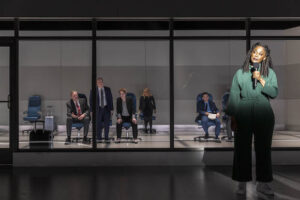Help: Show Review by Debra Nussbaum Cohen

(© Kate Glicksberg Photography)
The title of a new play now being performed at The Shed in midtown Manhattan is “Help.”
“Help” as a demand. A scream uttered by the narrator, a Black woman standing in for playwright, poet and essayist Claudia Rankine.
“Help” is a challenging 90 minutes of theater focused on white (especially male) privilege and on Black anger at the endless emotional work of conforming to White expectations. An important and timely subject, especially in a still-fractured post-Trump America, where we continue to deal with the noxious racism, sexism and classism that the former president’s overtly crass cruelty unleashed into public view.
There is nearly nothing entertaining about “Help.” Okay, perhaps the dance numbers into which the nine men and two women of the company occasionally and inexplicably break. At the end of one such number, when the company is gathered center stage and raised their hands in a Nazi salute, was discomfiting.
The world premiere of “Help” is a polemic which frequently feels more like being in a college lecture on the Black experience in modern America than theater.
Which, in fact, it is. “Help” is written almost verbatim on an essay Rankine wrote in The New York Times in 2019, which itself developed out of a course, “Constructions of Whiteness,” that Rankine taught at Yale, where she was a professor of poetry. The essay, by the way, is worth reading. Rankine has since left Yale for NYU, where she is a professor of Creative Writing. Rankine also won a MacArthur “Genius” grant in 2016.
Walking into the Griffin Theater on The Shed’s sixth floor, you pass an enclosed stage. Inside the glass-walled room are 11 people wearing somber business suits, dress shirts and shoes. They are in an airport lounge, which is where Rankine went to interview white people. She published an essay based on those interviews and observations in the essay titled “I Wanted to Know What White Men Thought About Their Privilege. So I Asked.”
In it, she wrote, “As I crisscrossed the United States, Europe and Africa giving talks about my work, I found myself considering these white men who passed hours with me in airport lounges, at gates, on planes. They seemed to me to make up the largest percentage of business travelers in the liminal spaces where we waited. That I was among them in airport lounges and in first-class cabins spoke in part to my own relative economic privilege, but the price of my ticket, of course, does not translate into social capital. I was always aware that my value in our culture’s eyes is determined by my skin color first and foremost. Maybe these other male travelers could answer my questions about white privilege. I felt certain that as a black woman, there had to be something I didn’t understand.”
What she learned fueled Rankine’s rage, which is clear in every line spoken by her narrator, who is well played by actress April Matthis. “Help” is directed by Taibi Magar.
But the play isn’t really about Whiteness at all. It is about Black rage. “Help” lumps all White people into one category. Which of course isn’t fair or just. Perhaps like the way too often Black people are lumped into one indistinct category.
Tom O’Keefe plays White Man #1, Jeremy Webb White Man #2, Joseph Medieros White Man #3, David Beach White Man #4, John Selya White Man #5, Zack McNally White Man #6, Jess Barbagallo White Man #7, Nick Wyman White Man #8 and Rory School #9. White Woman #1 is played by Tina Benko and White Woman #2 by Charlotte Bydwell.
I left thinking that the play is preaching to the mostly white New York City choir. I’d bet money that 98 percent of the people in the theater agreed with what Rankine and her narrator stand-in have to say. I left thinking that this isn’t the audience that needs to see it most; that it should be performed at universities and high schools. And in Arizona and Florida and Idaho – white, politically conservative male-governed states.
Yet after the play ended, as I walked out with my companion to catch a cab, a young Latinx woman stood just inside The Shed’s front door, holding the glass door open, and yelling at a middle-aged, red-headed white woman. The younger woman was shouting “you don’t get it! You don’t understand the play!” The older woman responded more quietly, but clearly not to the liking of the Latinx woman, who made it clear that the white woman had said something offensive about Asians and didn’t understand what made it offensive. A late section in “Help” talks about the number of Asians admitted to Ivy League universities and how one of the White protagonists of the play sighs when saying that his son didn’t get into Yale Early Decision, and that “it’s too bad he doesn’t have a race card to play.” He states this to Rankine/the narrator, totally unaware of its offensiveness.
So perhaps there are people even in midtown Manhattan who still haven’t gotten the message that Rankine is trying to convey. As hard as it is to take in, it should be heard. With all of the thorny questions and challenges it brings with it.
“Help” is playing at The Shed’s Griffin Theater through April 10th. It runs 90 minutes without intermission. The Shed is located in the burgeoning concrete jungle being extended on Manhattan’s far west side that is Hudson Yards. The address is 545 West 30th Street. Inside, the new building is beautiful and seating in the theater is comfortable.
Tags: claudia rankine, debra nussbaum cohen, HELP, Off Broadway plan, race relations, The Shed, theatre critic















